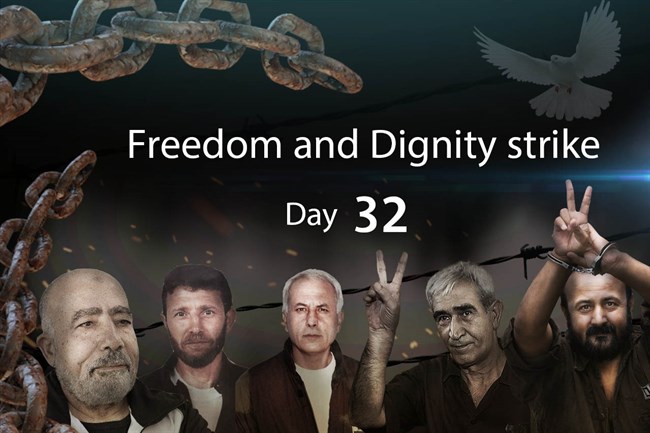As some 1,300 Palestinian entered the 32nd day of a mass hunger strike in Israeli prisons on Thursday, Palestinian officials have expressed concern over the deteriorating health conditions of the hunger strikers, saying that the situation for Palestinian prisoners and their families has become “unbearable.”
The media committee formed to support the hunger strikers reported that 60 Palestinian detainees joined the hunger strike at Israel’s Gilboa prison and have confirmed that they will continue forgoing food until the Israeli Prison Service (IPS) meets their demands, which include ending the denial of family visits, the right to pursue higher education, appropriate medical care and treatment, and an end to solitary confinement and administrative detention — imprisonment without charge or trial — among other demands for basic rights.
As the hunger strike entered its second month, the health conditions of the prisoners has become “very serious,” the committee said, especially after a number of hunger strikers have announced that they have begun abstaining from drinking water.
IPS has now moved all the hunger-striking prisoners to Israeli prisons with in-facility field hospitals — which were established at the start of the strike — the committee reported, adding that the prisoners have been transported in vehicles with steel seats and are handcuffed for hours en route to different Israeli prisons, causing severe strain on their already weak states.
Head of the Palestinian Committee of Prisoners’ Affairs Issa Qaraqe also said on Wednesday that all prisoners participating in the mass “Freedom and Dignity” hunger strike were transferred from across dozens of Israel’s prisons and concentrated into southern Israel’s Beersheba prison, northern Israel’s Shatta prison, and central Israel’s Ramla — all of which have in-prison field hospitals.
A spokesperson for IPS, however, told Ma’an on Wednesday that only the hunger-striking prisoners from the Negev desert-area Ktziot and Nafha prisons had been transferred to Beersheba prison, “in order to be closer to central Israel, in the case that they need to be treated at a hospital.”
IPS also confirmed that the hunger strikers were being treated in prison field clinics, but would be transferred to a civilian hospital if necessary.
The establishment of field hospitals for prisoners raised alarms that hunger strikers will be force fed en masse — violating international standards of medical ethics and international law that regard the practice as inhumane or even a form of torture.
The committee added that the national committee supporting the hunger strike has called for an escalation in confrontations with Israeli forces in the coming days. Dozens of Palestinians were injured across the occupied West Bank on Thursday, with one Palestinian shot and killed by an Israeli settler, during clashes that erupted after several solidarity marches in different districts of the occupied territory.
Separately, the media committee said that the committee’s lawyer Karim Ajwa visited Palestinian hunger striker Othman Ziada in Israel’s Ashkelon prison on Thursday.
Over the past three days, Ajwa said, IPS officials have moved four hunger strikers to Israel’s prison field clinics as their health deteriorated where Israeli doctors have reportedly offered medical care to the prisoners only in exchange for them ending their hunger strikes. Prisoners have rejected the offers, according to Ajwa, and have not been provided any medical care from the Israeli doctors.
The Handala Center for Prisoners and Former Prisoners released a statement saying the health conditions of imprisoned Popular Front for the Liberation of Palestine (PFLP) leader Ahmad Saadat and PFLP-affiliated journalist Muhammad al-Qiq have severely deteriorated, adding that the two urgently needed to be transferred to hospital for treatment.
Meanwhile, Qaraqe said in a statement that under the direction of Palestinian President Mahmoud Abbas, Palestinian efforts are being made to “find a fair solution” for the Palestinian hunger strikers. The efforts have been aimed at urging an Israeli response and preventing Israeli authorities from committing a “tragedy or a crime against hunger strikers” who have entered “a phase of real danger,” he said.
“We are in a race against time,” Qaraqe said, expressing concern over the possibility of death among hunger strikers, as Israeli authorities have continued to refuse negotiations.
On Monday, reports emerged in Israeli media that Palestinian security officials and officials of Israel’s internal security agency, the Shin Bet, were attempting to reach an agreement that would end the hunger strike.
Meanwhile, hunger-striking prisoner Karim Yunis, the longest serving Palestinian prisoner, insisted that any legitimate negotiations must include leaders of the strike such as Barghouthi, and rejected reported attempts by Israeli intelligence as “false and futile negotiations aimed at breaking the hunger strike in exchange for empty promises.”






 WhatsApp us
WhatsApp us 

